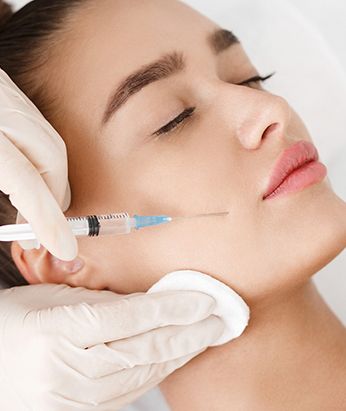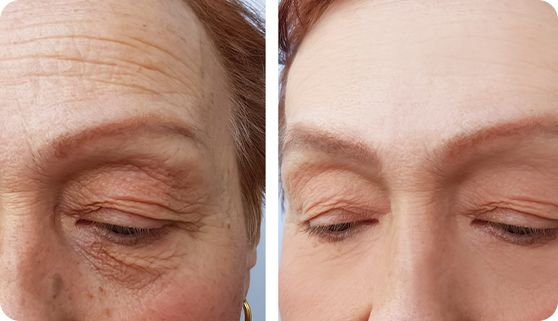What is Botox, what does it do and can it lead to botulism?

Botox injections are a popular way of eliminating fine lines and wrinkles across the face by relaxing specific facial muscles. But what exactly are Botox injections made of and how do they work? The injections work via a neurotoxin, botulinum toxin type A, which is produced by the bacterium Clostridium botulinum and blocks the release of a particular neurotransmitter which is responsible for muscle movement.
So, what you really want to know is whether or not Botox is safe. Well, Infection with the bacterium Clostridium botulinum is known to cause botulism, which is a life-threatening form of food poisoning. In fact, botulinum toxin is one of the most toxic biological substances known. However, the cosmetic use of Botox is considered to be very safe. Botox injections contain very tiny doses of botulinum toxin, which stays localised to the treatment site. This enables excellent results for facial wrinkles, with minimal systemic side effects.
How much botulinum toxin is in the Botox injection?
Being such a lethal toxin, it is essential that only miniscule doses of botulinum toxin are used in cosmetic treatments. In fact, injection with just 2 billionths of a gram of botulinum toxin could kill an adult, over 1 million people could be killed with just 1 gram of the toxin and the Earth’s entire population could be wiped out by just 2kg.
Each vial of Botox contains very tiny amounts of botulinum toxin, around 0.00000000005 or 5.0 x 10-11 grams per unit to be precise! Levels such as this are considered to be very safe and it is reassuring to know that Botox is FDA-approved for cosmetic use.
Does Botox get into your bloodstream?
Botox remains localised to its injection site, ensuring that it does not move throughout the body. This means that systemic side effects from Botox are very rare. Botox can move up to 3cm from the injection site so it is important that your treatment provider is very precise with their application.
There is some evidence which suggests that traces of the botulinum toxin may enter into your bloodstream or lymph system. However, once in the bloodstream, the botulinum toxin is not capable of crossing the blood-brain barrier.
Are there any dangers of having Botox in the forehead?

Botox is considered to be a relatively safe cosmetic treatment, no matter which part of the face it is injected into. It is most commonly used to treat fine lines and wrinkles in the forehead area, also known as frown lines, the area around the eyes and along the neck.
Botox treatment does have some potential side effects, however most patients report that these are usually mild and short-lived. Typical side effects include:
- Localised redness and swelling
- Localised bruising and/or bleeding
- A headache and flu-like symptoms
- Temporary weakness and drooping at the treated area, for example drooping eyelids
It is important to choose your treatment provider carefully, as having your Botox administered by a highly qualified and experienced doctor can limit your risk of side effects. An inexperienced practitioner may inject too much Botox into your face, leaving you with a frozen look as you are unable to move the muscles in that area at all. The Harvard trained doctors at Evolution MedSpa Boston are very experienced at injecting Botox into all areas of the face and will be more than happy to discuss the procedure with you in detail at your initial consultation.
Can you be allergic to Botox?
There is a very slim chance that you may have an allergic reaction to one of the ingredients or preservatives present in your Botox injection. An allergic reaction is characterised by the following symptoms: itching, difficulty breathing, wheezing, feeling faint and swelling of the face, lips, throat or tongue. You must seek emergency medical advice if you experience any of these warning signs after you receive Botox.
What are the long term effects of Botox in the forehead? What do long term Botox studies say?
The effects of Botox on lines and wrinkles are temporary, which is why you have to repeat your injections regularly in order to maintain your results. But, are there any long term effects of using Botox regularly?
Research data suggests that regular Botox use can lead to a weakening of your muscles at the injection site. This is basically due to a lack of movement. Any muscle that remains unused for long periods of time weakens and shrinks and this is exactly what is happening to your facial muscles when you have Botox treatment. However, it is not all bad, as weakness of these muscles means that you will have to have Botox treatment less often!
Long term Botox use may also cause visible thinning of your skin at the treatment site. This is not very common, but is more likely in patients who start Botox early, such as in their early 20s.
How long does Botox take to work and how long does Botox in the forehead last?
Botox normally takes around 4-5 days to begin to have a visible effect, with full results being achieved after 2 weeks.
The effects of Botox on your forehead wrinkles will typically last for between 3-6 months. After this time, your wrinkles will slowly return and you will need to repeat your treatment.
Is it normal to have a large lump on your forehead after Botox?
Swelling at the injection site is common following Botox treatment, and typically resolves after a few days. Large, hard lumps which are present at the injection site are usually caused by some trauma to a local small blood vessel. As long as you are not experiencing any pain and the lump is not growing, then you need not worry. Obviously, if you have any symptoms which are concerning you after your treatment, then consult your treatment provider.
What other conditions can Botox be used to treat?
As well as its popularity in the cosmetic industry, Botox is commonly used to treat a range of medical conditions, including:
- Hyperhidrosis (excessive sweating)
- Chronic migraines
- Cervical dystonia
- Overactive bladder
The side effects associated with using Botox for migraines and other medical conditions are the same as those reported for Botox cosmetic.
Book your Botox consultation today
If you think that Botox is the right treatment for you, or you want to find out more about the anti-aging treatments available to you, then contact Evolution MedSpa Boston for an initial consultation. Harvard-trained cosmetic specialists, Dr. Eric Capiello and Dr. Mariam Capiello, carry out all cosmetic treatments themselves and will be there with you throughout the whole treatment process.

Recent Comments